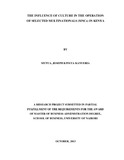| dc.description.abstract | The purpose of the research study was to determine the influences of culture on the
operations of multinational corporations in Kenya. The study in particular sought to
determine the language factor as a cultural influence, examine the effects of education
on culture, and identify the social institutions that influence culture in MNCs. Further
the study sought to determine the values and attitudes that influence culture in the
business operations of multinational corporations, establish the influence of religion
and also identify the manners and customs that have impact on the operations of the
MNCs. Operating in ways that are congruent with a firm’s cultural contexts can
improve business performance. For multinational companies, some variation in
operating practices across locations is normally required. And as companies push
further with variation across locations, complementary moves such as decentralization
of decision-making and indigenization of in-country management teams can support a
company’s ability to be responsive to local conditions. At the extreme, a multinational
becomes so localized that it gives up all of its potential interactional synergies and
performs no better (and perhaps even worse) than a series of separate local firms
would. Therefore, managing adaptation (to cultural as well as other types of
differences) entails finding ways to limit the need for and/or cost of variation. Cultural
differences remain persistent and present an array of challenges for multinational
companies. Firms that manage adaptation effectively are able to achieve congruence
in the various cultures where they operate while extending their main sources of
advantage across borders, and in some cases even making cultural diversity itself a
source of advantage. This study endeavours to determine the influences of culture on
the operations of multinational corporations in Kenya. The study was able to meet this
objective by employing a descriptive research design. The main tool for data
collection for this study included a questionnaire for the major multinational
corporations operating in Kenya, these were a total of 20 companies. In both practice
and theory, the cultural distances between countries do vary and hence affecting
business decisions of companies operating in cross nations. The study found cultural
factors such as religion, education, language, cultural infrastructure, social
institutions, values and attitudes, and manners and customs to influence the way
multinational companies carries out their operations. Different factors have unique
influence, education plays a major role in the passing on and sharing of culture, social
institutions affects the buying power and decision making positions as well as the
consumption patterns of a society. Religion on the other hand provides a basis for
trans-cultural similarities and influences consumption of goods and services as well as
consumptions patterns. The study found that the culture of the society is highly
influential on the performance of the firm in a given society and recommends
companies to understand societal culture and align their internal cultures with those of
the society they are investing and operating in so as to gain from the culture. | en |

